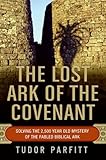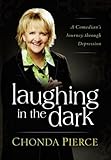 The Lost Ark of the Covenant: Solving the 2,500 Year Old Mystery of the Fabled Biblical Ark
The Lost Ark of the Covenant: Solving the 2,500 Year Old Mystery of the Fabled Biblical Ark by Tudor Parfitt is an extremely entertaining book. Mr. Parfitt's storytelling style is immediate and entertaining, and the adventure takes him across a number of continents and into contact with any number of fascinating people over the course of 20 years. It is
Raiders of the Lost Ark in real life (and without the Nazis). There are things that bother me about the book... not the least of these being the conclusion. But we'll get there in a minute.
A number of things in the narrative strike me as factual errors. For example, speaking of the Ark, on page 14 Mr. Parfitt writes that the stories say that "Anyone who as much as looked at it would be blasted by its awesome power." Throughout his research Mr. Parfitt consults not only Biblical texts but also extracanonical historical material, so there may well be some source he is referring to that I am not familiar with, but the Bible does not, to my knowledge, say that anyone was punished by God or the Ark for looking at it.
Touching it, yes. Possessing it if you were not God's chosen people, yes. Innocently looking at it, no.
On page 30 it says that the Ark "...was said to have generated some kind of energy that blasted a dry path across the River Jordan." I don't see anything about a blast of energy in
the account of this in the book of Joshua. (Apparently this statement came from
some oral traditions that I was not aware of before now.)
In another place, he ends a chapter by describing a time he dreamed about "A bellicose Moses [who] was dreaming of bloody revolt and war." This seems to me to be a misinterpretation of the character of Moses, who unless I am mistaken
only killed with his own hands once, to protect his kinspeople, and who far from being quarrelsome
was initially intimidated to even enter the presence of the Pharoah, in whose house he had been raised as a grandson. Another place where I think Parfitt misunderstands a Bible character is the section where he characterizes King David as doing a lewd dance holding the Ark, actually thrusting into the ark as he danced, which seems like an odd thing to do to an object of such holiness that you can't even "look at it" (according to Parfitt) without being blasted to smithereens (Biblical account is
here). I guess looking at something is what, less holy that placing one's sexual organs into it? King David was clearly no choirboy, but I do think he had more reverence for God than that.
I did enjoy some of the stabs at humor in the story. There is a chapter that refers to an Indiana Jones-esque fear of snakes, and I loved this line, spoken to Parfitt by his native host: "'Nothing will get into your room. Except possibly...' his voice trailed off." A few times, however, what seems to be intended as humor struck me as borderline offensive, particularly his use of the word "Copt" as almost a derogatory term. He explains early in chapter 4 that a "Copt" is an Egyptian of particular racial and religious derivative, but then he constantly uses the term for his friend Daud only in derogatory statements, such as "you excitable little Copt," "you ineffably daft Copt," "You loathsome little Copt," "you dirty-minded Copt." It's almost as though he has turned the innocent word into a racial slur... it began to annoy me every time the word turned up on the page. Probably intended as humor, and usually I "get" the British sense of humor just fine (Parfitt is British), but in this case it seems to my American ears to fall flat.
I was also uncomfortable with the use several times of the word "cult" for religions that the text implies might be forms of Judaism. What is the difference between a "religion" and a "cult?" As best I can tell, the difference is that a "religion" is considered acceptable by the person using the word, and a "cult" is not. I imagine that to some people, my own religious beliefs would be considered a "cult." To me, it doesn't seem particularly scholarly to repeatedly use a word with negative connotations when perfectly good language without those connotations is available.
Before I give you my objections to Parfitt's conclusions, I'd better include a
***** SPOILER ALERT *****
This book is in large part a detective story. If you read the next few paragraphs, you'll know whodunnit. You have been warned; stop here if you don't want to know the ending!

Now that that's out of the way... in the course of Parfitt's research, he thinks over several things. One is that there were at least
two Arks of the Covenant. The textual basis for this claim is that in one place
it says that Moses made a wooden ark to contain the tablets that God gave him, and in another place it says that
a craftsman named Bezalel made a more ornate ark which is described like we generally picture the ark today (the "Moses ark" is not actually described at all, except that it is made of wood). This is a view held by more historians than just Parfitt, but I'm not really sure if this constitutes indisputable evidence; just because something is not described in detail in one place and then it is described in detail somewhere else does not mean that it is not the same thing. And saying in one spot that Bezalel made it and in another spot that Moses made it doesn't to me rule out the two incidents being one and the same. If I hire a contractor to build a house and then tell a friend about it, don't I say "I'm building a house" even though I probably won't nail a single nail with my own hands?
But then Parfitt goes on to theorize that there may have been dozens of arks, and that scribes went back later and cleaned up the text so that it didn't show that, forgetting that one inconsistency. I can't imagine why scribes who would leave in things like their most celebrated king, an ancestor of their promised messiah,
forcing sex on the wife of one of his officers and then having the officer killed in battle to cover it up, but then turn around and change the text over a gold box. It doesn't make any sense to me. It makes sense to Parfitt.
He also seems to believe that the whole idea for the ark was borrowed from similar religious relics already being used by the surrounding ethnic groups (for example, ark-like relics found in
King Tut's tomb) and that this somehow gives less validity to the Ark's divine origins. I would counter with the idea that God speaks to people of individual times in terms that they can understand. Jesus' parables are not about jet airplanes... most of them are agricultural or just about plain people. I think it is highly likely that God had His people build a gold box for Him because they were aware that other religions had gold boxes for their own gods. The big difference is that where other boxes of the kind had a statue of the god himself sitting between two creatures, the Israelite ark had two creatures and between them was... an
empty seat. Which would say something about that particular god to whoever saw it. Is this god so mysterious that they don't know what he looks like? Is he too holy to be personally rendered in gold? Since we're not ancient Arabs we probably will never know, but just because other religions may have boxes on poles among their relics does not invalidate this one.
Finally, Parfitt concludes that the ark was (the arks were?)
a bowl-shaped drum called a "ngoma" which was used to create music, to carry objects, and which was loaded with primitive gunpowder and ignited to create flashes of fire and great noises. The enemies of the Israelites, he postulates, may have been given some mild poison to weaken their hearts, and then when the ngoma was ignited, the loud unexpected sound would have been enough to overtax their hearts and kill them. He believes that he has found the "original" Ark/ngoma in a museum in Zimbabwe... at least as original as it gets, since the Ark of Biblical times has since been destroyed and this one was built using the remains.
It's an interesting idea, but I don't buy it. To go that way you first have to assume that the Scriptures were intentionally altered to make a round drum look like a rectangular Egyptian box, and then you have to assume that it was not the holy power of a holy god that emanated from the Ark, but the ordinary power of low-grade gunpowder. Basically, you have to ignore the written canon of Scripture and substitute ideas gleaned from oral traditions, texts rejected centuries ago as inaccurate and inauthentic, and half-forgotten rumors. I am of the camp that chooses to assume that Scripture basically means what it says, and I don't really see a compelling reason to assume that just because we haven't found a gold-inlayed wooden box with metal rings on it that it doesn't exist somewhere, or at least didn't exist somewhere at some point in history. It makes for fun reading, but the ending didn't strike me as conclusive.
If you like Harrison Ford movies, by all means, read the book. It's fun to think about. I would caution you, though, to not easily abandon faith in Scripture, whether you are a Christian or a Jew, for something that calls itself scholarship. If Tudor Parfitt convinces you, that's fine. Maybe I'm wrong, but he didn't convince me.









